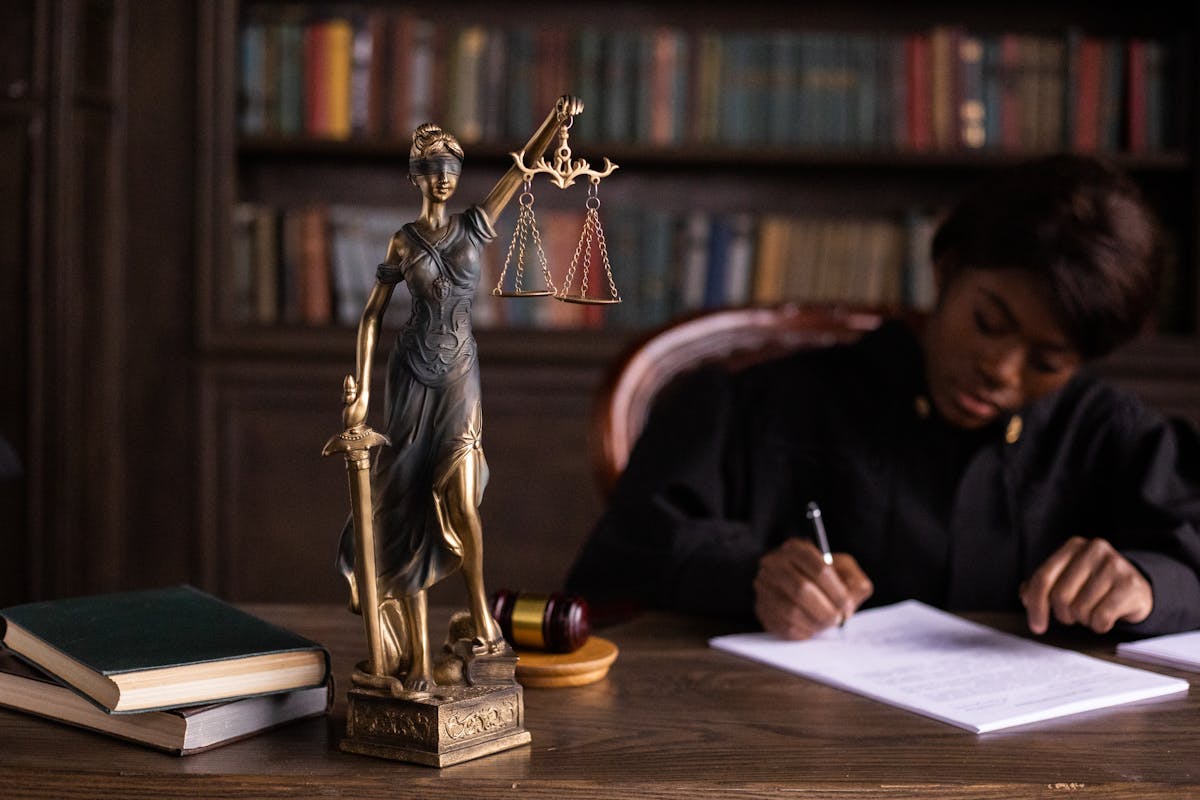
A court stenographer, also known as a court reporter, is a professional who writes down legal proceedings exactly as they happen. Using specialized tools, such as stenographic machines, they document everything said during trials, depositions, hearings, and other legal events.
Court stenographers play a vital role in the legal system, ensuring every word spoken during legal proceedings is accurately recorded and preserved. Their work forms the backbone of legal documentation, aiding attorneys, judges, and even process servers in their duties.
Let’s explore the roles and responsibilities of court stenographers, their relationship with process servers, and their vital contributions to the legal system.
The Vital Role of Stenographers in Legal Proceedings
Stenographers produce transcripts that serve as official legal records. These records are important for appeals and case reviews. They also ensure all parties involved have access to accurate documentation.
Though court stenographers work behind the scenes, their contributions directly affect the legal process. Their precision ensures no detail is missed, providing a solid foundation for attorneys, judges, paralegals, and process servers to do their work effectively.
Key Responsibilities of a Courtroom Stenographer
Court stenographers are tasked with responsibilities that demand focus, attention to detail, and a commitment to accuracy. These responsibilities include:
Real-Time Transcription
Using a stenotype machine, stenographers transcribe spoken words as they are being said. By employing shorthand techniques and advanced technology, they maintain speed and precision, often exceeding 200 words per minute.
This ability allows them to provide immediate access to dialogue, which is crucial in high-stakes environments such as courtrooms and live broadcasts. Their expertise not only aids in accuracy but also ensures that every voice is captured, creating a comprehensive record of the proceedings.
Producing Official Transcripts
After proceedings, stenographers format their notes into official transcripts that legal professionals can use. These documents might be submitted as evidence, referenced in appeals, or stored as part of court records.
The process involves careful proofreading and editing to ensure that the final transcript is free of errors and reflects the true essence of the spoken words. Additionally, transcripts are often required to follow specific formatting guidelines, which can vary depending on the jurisdiction or institution.
Maintaining Confidentiality
Because stenographers handle sensitive information, they are bound by strict confidentiality agreements to protect the privacy of all parties involved. This obligation extends beyond the courtroom, as they may deal with private conversations and confidential matters.
Breaching confidentiality can have serious legal repercussions. This applies to both the stenographer and the parties involved. This underscores the importance of trust in their professional relationships.
Assisting Legal Professionals
The transcripts created by stenographers serve as valuable resources for attorneys, judges, and process servers. They enable smooth legal proceedings and minimize unnecessary delays. These documents provide clear and accurate accounts of what transpired, which can be crucial for case preparations and legal strategies.
Moreover, having a reliable transcript allows legal professionals to focus on their arguments and evidence, knowing they have a solid reference to rely on during trials and negotiations.
These responsibilities underscore the critical role stenographers play in the legal system, where precision and reliability are essential.
Why Accurate Court Transcriptions Matter
Here’s how accurate transcription impacts key legal roles:
|
Stakeholder |
Impact of Accurate Transcriptions |
|
Attorneys |
Helps prepare for appeals, cross-examinations, and future hearings without missing critical details. |
|
Judges |
Provides a reliable record to review testimonies and evidence, ensuring informed decisions. |
|
Process Servers |
Enables correct and efficient service of legal documents, minimizing errors or delays. |
|
Clients |
Protects their legal rights by ensuring transparency and fairness in proceedings. |
How to Become a Court Reporter: Steps to Start Your Career

Becoming a court stenographer is a rewarding career path for individuals who work well under pressure and excel in detail-oriented tasks. Here’s how to become a court stenographer:
1. Educational Requirements
Most aspiring stenographers complete a specialized court reporting program at a community college or trade school. These programs teach shorthand techniques, legal terminology, and transcription skills.
2. Certification
In many states, court stenographers must obtain certifications like the Certified Shorthand Reporter (CSR) or credentials from the National Court Reporters Association (NCRA). These certifications validate a stenographer’s skills and knowledge of legal processes.
3. Developing Skills
Court stenographers must achieve high typing speeds and impeccable accuracy. Certification exams often require speeds above 200 words per minute with minimal errors.
4. Gaining Experience
Hands-on experience is critical. Many stenographers begin their careers as interns with law offices, government agencies, or private court reporting firms to hone their skills.
The journey to becoming a court stenographer is comparable to other legal roles, such as process serving, as both require specialized training and a dedication to excellence.
To further illustrate how to become a court stenographer, here’s a clear step-by-step breakdown of the journey:
|
Step |
Details |
|
Education |
Complete a court reporting program at a community college or trade school. |
|
Skill Development |
Achieve advanced typing speed and accuracy through practice and specialized training. |
|
Certification |
Obtain credentials like Certified Shorthand Reporter (CSR) or certifications from NCRA. |
|
Gain Experience |
Intern or work in entry-level roles within law firms, government agencies, or private reporting firms. |
|
Explore Specializations |
Consider niche areas like real-time broadcasting or closed captioning to increase earnings. |
Court Reporting Salary: What Can You Earn?
Court stenographers can earn competitive salaries based on factors like location, experience, and specialization. On average, stenographers in the United States earn around $55,000 annually.
In urban centers like New York City and Los Angeles, salaries can exceed $75,000 due to higher demand and living costs. Conversely, in rural areas, average salaries may be closer to $40,000.
Factors Influencing Salary
-
Location
Urban areas with high litigation rates tend to offer higher pay. This is primarily due to the increased demand for stenographers in legal settings such as courtrooms and depositions.
Additionally, larger cities often have more law firms and corporate entities, creating a competitive market for skilled stenographers, which can drive up salaries.
-
Experience
Veteran stenographers often secure better-paying roles than those just starting out. With years of practice, experienced stenographers develop a speed and accuracy that is highly valued in the industry.
Their familiarity with various legal terminologies and courtroom procedures also makes them more attractive to employers, allowing them to negotiate better compensation packages.
-
Specialized Roles
Stenographers who work in areas like closed captioning or real-time reporting for TV broadcasts can command higher salaries. These specialized roles require advanced skills, including the ability to transcribe spoken words accurately and quickly in real-time.
Furthermore, the demand for accessibility in media has increased, making stenographers in these fields essential, which further enhances their earning potential.
Like process servers, stenographers often have the flexibility to choose between freelance work or full-time positions, allowing them to tailor their careers to their preferences.
The Role of a Court Stenographer in Legal Proceedings
Court stenographers contribute more than just recordings; they ensure every spoken word is preserved, making their role indispensable in the following ways:
Supporting Attorneys
Lawyers rely on accurate transcripts to prepare for appeals, cross-examinations, and future court sessions. Stenographers ensure no key details are lost.
These transcripts provide a comprehensive record of what was said, allowing attorneys to strategize effectively.
Additionally, having precise documentation can significantly impact the outcome of a case by highlighting inconsistencies in testimonies.
Assisting Judges
Judges use transcripts to revisit testimonies, analyze evidence, and make informed rulings. A reliable record reduces ambiguity and upholds judicial fairness.
Transcripts allow judges to refresh their memories about the proceedings, ensuring they base their decisions on a thorough understanding of the case.
Moreover, they serve as an essential resource for appellate courts reviewing decisions for potential errors.
Facilitating Process Servers
Process servers benefit from clear transcripts when reviewing case details. Accurate documentation helps ensure court orders, subpoenas, or summons are served correctly.
The transcripts provide vital context regarding the parties involved and the nature of the legal proceedings. Furthermore, having precise records helps process servers verify compliance with legal requirements, minimizing the risk of delays or challenges in court.
Stenographers are a vital link in the legal chain, ensuring transparency and accountability for all parties.
Court Stenographer vs. Paralegal: Key Differences Explained
While both court stenographers and paralegals are essential to the legal system, their responsibilities differ:
- Court Stenographer: Focus on transcribing court proceedings in real-time and creating accurate legal records.
- Paralegal: Handle legal research, case management, and preparation of legal documents.
Despite these differences, their work often overlaps. Paralegals frequently reference transcripts created by stenographers when organizing case files, and stenographers ensure the accuracy of the records paralegals rely on.
The Connection Between Court Stenographers and Process Servers
The legal system relies on collaboration and accuracy, and while court stenographers and process servers have distinct roles, their work is interconnected:
Legal Record Accuracy
The records created by stenographers serve as a foundation for legal actions, helping process servers understand the details of a case.
Accurate transcription ensures that all parties involved have a reliable reference, reducing the chances of misunderstandings.
Additionally, these records can serve as vital evidence in court, influencing the outcome of legal proceedings.
Effective Communication
Process servers depend on clear transcripts to interpret court orders and convey them effectively to recipients.
The precision of these transcripts is crucial for ensuring that legal notices are served correctly and on time.
Miscommunication can lead to delays or legal complications, making effective communication paramount in the legal process.
Mutual Dependence
Both professions support attorneys and clients by preserving the integrity of the legal process, highlighting the system’s interdependent nature.
Their collaboration ensures that justice is served efficiently and accurately, reinforcing the trust placed in the legal system.
This mutual dependence fosters a streamlined workflow that benefits all stakeholders involved in legal proceedings.
Why Accurate Court Transcriptions Matter
Inaccurate transcripts can lead to serious consequences, such as delays, misunderstandings, or even case dismissals. For example:
- Lawyers may miss critical details needed for a trial. This oversight can result in weak arguments and diminished chances of a favorable outcome for their clients. Additionally, essential evidence that could have swayed the jury might be overlooked, ultimately impacting the case’s integrity.
- Process servers may face difficulties in serving documents due to vague instructions. This can lead to delays in legal proceedings, causing frustration for all parties involved. Furthermore, improper service may result in a case being dismissed or delayed, which can significantly affect the timeline of legal resolutions.
- Judges could have difficulty reviewing evidence, leading to flawed rulings. If proof is not presented clearly or is misinterpreted, it may skew the judge’s understanding of the case. This can result in unjust outcomes, where the rights of individuals are compromised based on incomplete or misunderstood information.
Accurate transcription ensures everyone involved has the tools to perform their roles effectively, maintaining fairness and efficiency in the legal process.
Need Legal Support? Here’s Where to Start
Whether you’re navigating legal proceedings, handling documentation, or serving legal papers, having trustworthy professionals is crucial.
From precise court transcripts to reliable process serving, working with experts ensures your legal needs are handled with care and efficiency.
D&R Legal Process Service, LLC provides dependable and efficient legal support tailored to your needs, backed by a deep understanding of the legal system.







